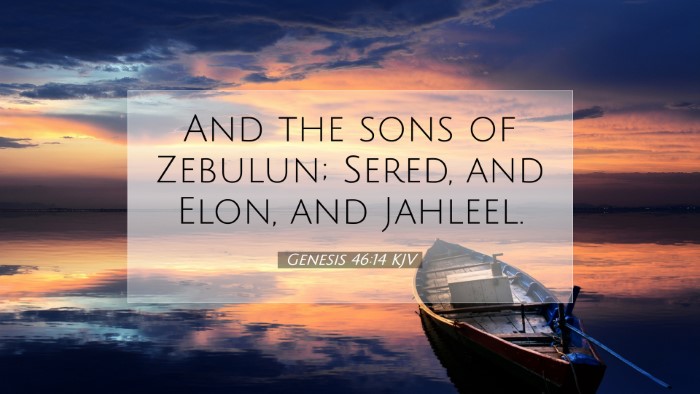Commentary on Genesis 46:14
Verse Summary: "And the sons of Zilpah, Leah's handmaid; Gad, and Asher. These are the sons of Zilpah, whom Laban gave to Leah his daughter: and these she bare unto Jacob: even sixteen souls." (Genesis 46:14)
Introduction
This verse presents a concise but pivotal enumeration of Jacob's descendants as they prepare to leave Canaan and enter Egypt. The mention of Zilpah—Leah's maid—highlights the complex family dynamics within Jacob's household, a theme fundamental to understanding the unfolding of biblical history.
Historical Context
Genesis 46 captures the moment just before the Israelites migrate to Egypt. Jacob, driven by famine and the need to sustain his family, is about to reunite with his son Joseph. In this context, the genealogical record serves both to affirm God’s covenant promises to Jacob and to illustrate the fulfillment of those promises through his numerous offspring.
Insights from Public Domain Commentaries
-
Matthew Henry:
Henry emphasizes the providence of God in preserving the lineage of Jacob through Zilpah’s lineage. The children of Zilpah, Gad and Asher, represent the continuation of God's covenantal blessings. His commentary points out that even in complicated family structures, God's plans unfold according to His divine wisdom.
-
Albert Barnes:
Barnes notes the significance of Zilpah's sons in the context of Israel's identity. By specifying the mothers of each son, Barnes invites readers to reflect upon the social and familial hierarchies that existed. He highlights that Gad means "troop," indicative of his role in Israel’s future as a military tribe, while Asher means "blessed," reflecting the abundance associated with this lineage.
-
Adam Clarke:
Clarke provides insights into the meanings of the names and their implications on the tribes’ characteristics. He suggests that the sons of Zilpah were not merely footnotes to the family tree but embody significant roles within the Israelite narrative, exhibiting God’s faithfulness to Jacob despite human complexities and strife.
Theological Reflections
This verse opens up for theological inquiry on themes of lineage, identity, and divine promise. The complexities of Jacob's family reflect the often tumultuous human relationships and how they weave into the broader tapestry of God's plan. Each son’s name signifies an aspect of their character and future role within Israel, which can inspire modern readers to consider their identities as part of a larger story.
Application for Today
-
The Importance of Legacy:
This verse serves as a reminder of the importance of legacy—both spiritual and familial. The development of Israel’s tribes reminds modern leaders to nurture the next generation in faith and moral stature.
-
Dealing with Complexity:
Jacob's family dynamics teach us that complexity and conflict can exist alongside God's purpose. Pastors and leaders can draw strength and guidance from this, encouraging congregations to embrace diversity within their communities.
-
God’s Sovereignty:
The narrative affirms God’s sovereign control over history and individuals’ lives, illustrating how He utilizes even the circumstances of strife for His glory. This should reassure believers of God's continual presence and guidance, especially during challenging times.
Conclusion
Genesis 46:14, though a genealogical record, is rich in theological significance and historical context. By valuably contributing to the heritage of Israel, Zilpah's sons remind us of God's faithfulness across generations. Understanding their roles provides insights not just into the ancient narrative but into how we might comprehend and fulfill our own roles within God's ongoing story of redemption.


